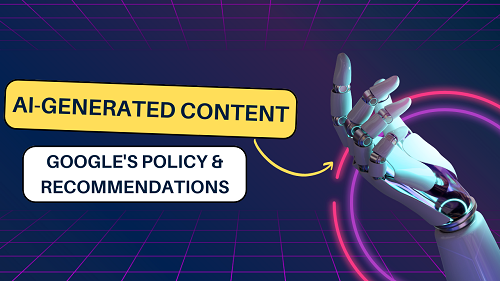AI-Generated Content: Google’s Policy & Recommendations
Artificial Intelligence (AI) has become a game-changer in various industries, revolutionizing our lives and work. Among its numerous applications, AI-powered tools like ChatGPT and others have gained significant popularity, particularly in content creation. As content creators explore the potential of AI-generated content, it becomes crucial to understand Google’s stance on this matter.
This blog presents key insights from the Google Search Central Live Tokyo 2023 event. Shedding light on Google’s AI policy and recommendations for content creators.

Google’s Evolving Perspective on AI-Generated Content
In the past, Google expressed concerns about AI-generated content, considering it violated its search engine guidelines. The company even developed tools to detect and penalize such content. However, in a recent update, Google clarified that AI-generated content is not inherently against its guidelines. Instead, the focus is on rewarding high-quality content, regardless of its generation method. This marks a shift in approach, emphasizing the importance of content quality and relevance over the means of creation.
Distinction Between Spam and Helpful AI-Generated Content
Google’s update distinguishes between content generated solely to manipulate search engine rankings (considered spam) and AI-generated content that offers value and helpful insights. While automatically generated SEO-optimized content lacking value may be flagged as spam, AI can be a powerful tool for creating content that benefits users. This clarification allows content creators to use AI responsibly while ensuring content value remains paramount.
AI as an Empowering Tool for Content Creators
Google acknowledges the long-standing use of automation in generating helpful content, such as sports scores and weather forecasts. Additionally, AI has the potential to enhance creativity and expression, serving as a critical tool for empowering content creators to produce exceptional web content. Google’s stance aligns with its vision of empowering individuals with innovative technologies to enhance content development and user experiences.
Recommended Practices for Responsible Content Creation
To ensure ethical and effective AI use, Google provides recommendations for content creators:
Avoiding SEO-Optimized Junk Content: Content creators should refrain from publishing automatically generated SEO-optimized content that lacks valuable insights or originality.
Leveraging AI/Automation for High-Quality Content: Creators can use AI and automation to generate essential content components. However, reviewing and refining the content to meet high-quality standards is crucial.
Adding Disclosures for AI-Generated Content: While not mandatory, adding disclosures fosters transparency and helps users understand AI’s role in content creation.
Using Disclosures When Reasonably Expected: Creators should use disclosures for AI-generated content when users reasonably expect automation or AI involvement.
Avoiding AI Author Bylines: To maintain authenticity, content creators should avoid attributing authorship to AI and properly credit the AI tool used.
Conclusion: Striking the Right Balance
In conclusion, Google’s evolving stance on AI-generated content underscores the value of high-quality material, regardless of its generation method. By responsibly using AI and adhering to Google’s guidelines, content creators can create meaningful, engaging content that resonates with their audience while ensuring a positive user experience and search visibility. The harmonious blend of human creativity and AI assistance will shape the future of content creation, driving innovation in the dynamic digital landscape. As AI continues to evolve, content creators who adapt and align responsibly will thrive in meeting the needs of their audience and staying at the forefront of search engine optimization.


